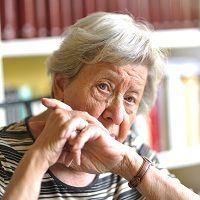Article
Treating Complicated Grief in Older Adults
Author(s):
Complicated grief needs to be distinguished from depression in older adults, according to a paper published in JAMA Psychiatry.

Treatment specifically designed to treat older adults dealing with complicated grief (CG) is better than using a depression treatment, according to research published in JAMA Psychiatry.
Researchers from the Columbia University School of Social Work in New York City enrolled 151 patients (mean age 66 years) between August 2008 to January 2013. The authors had previously developed a formed of targeted CG treatment (CGT), based on an attachment therapy model. The participants had lost a spouse, partner, parent, child, or other relative or friend 3.2 years prior, on average.
The participants were enrolled in 2 groups. The 74 patients in the CGT group was designed with the goal of resolving grief complications, to facilitate natural mourning, loss, and restoration. The 77 patients in the interpersonal psychotherapy (IPT) group was conducted with patients and involved effects on mood, encouraged realistic assessment of the deceased, talked about the death and worked to enhance relationships and activities in the present.
Assessments were conducted at 8 weeks from baseline, 12 weeks from baseline, 16 weeks from baseline, and 20 weeks after baseline, which was the cessation of treatment. The patients received 16 sessions of either CGT or IPT, which were conducted on a weekly basis.
The researchers concluded that both the CGT and IPT treatments helped patients, though CGT was twice as effective as IPT. CGT therapy was effective in 52 participants, or 70 percent of their respective group, while IPT helped 24 individuals, or 32 percent of their respective group.
Illness severity was also affected. In the IPT group, 41 participants (or 64.1 percent) were still at least moderately ill at 20 weeks from baseline. On the other hand, in the CGT group, 22 individuals, or 35.2 percent, were still moderately ill at 20 weeks from baseline. Symptom reduction was measured on a weekly basis, and saw a greater reduction per week in the CGT group. The results were not moderated by participant age.
“Complicated grief is an under recognized public health problem that likely affects millions of people in the United States, many of them elderly,” the authors concluded. “Given a growing elderly population, increased rates of bereavement with age, and the distress and impairment associated with CG, effective treatment should have important public health outcomes.”
The authors restate that clinicians need to know how to treat CG in older adults, especially noting that physicians need to be able to distinguish CG from depression.





